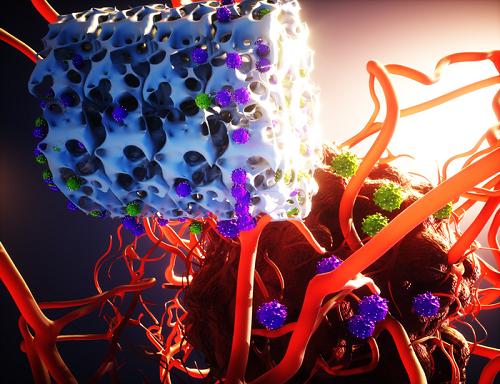April 21, 2022 -- A new technology that helps CAR T cells attack cancer cells more aggressively than conventional methods has been published by researchers from North Carolina State University (NC State) and the University of North Carolina at Chapel Hill (UNC). Called multifunctional alginate scaffold for T-cell engineering and release (MASTER), the technology was described in a paper published on March 24 in Nature Biotechnology.
In the paper, researchers described their work on implantable CAR T cells, which are T cells that have been engineered to identify cancer cells and destroy them. They hope the technology will offer an improvement on conventional CAR T-cell therapy, which is limited by length, cost, and labor-intensive ex vivo manufacturing procedures that might lead to cell products with heterogeneous composition.
On the other hand, MASTER uses nonimmunogenic materials that have been approved by the U.S. Food and Drug Administration to create a local, nurturing niche for αCD3-mediated and αCD28-mediated cell activation and interleukin-mediated proliferation. Scaffold macroporosity facilitates homogeneous cell distribution and creates an interface for interaction between viral particles and T cells, preventing viral shedding and off-target gene transfer that might result from systemic approaches.
MASTER can be directly loaded with patient-derived T cells and viral particles encoding the CAR and implanted on the same day to generate CAR T cells in vivo. MASTER is designed to host T cells and viral particles, stimulate T cell activation and proliferation, promote T cell transduction, locally expand CAR T cells, and sustainably release fully functional CAR T cells to control tumor growth.
Unlike conventional CAR T cell processes that can take weeks, with MASTER the cells are brought back to the hospital and infused into the patient's bloodstream.
"Our MASTER technology takes the cumbersome and time-consuming activation, reprogramming and expansion steps and performs them inside the patient," said Pritha Agarwal, PhD, a postdoctoral researcher in the biomedical engineering department at NC State and UNC and lead author. "This transforms the multi-week process into a single-day procedure," she added.
In vivo, mice were implanted with lymphoma and treated with MASTER-produced CAR T cells and conventional intravenously infused CAR T cells. MASTER showed significant delay and increase of CAR T cells for a prolonged period compared to conventional.
In particular, MASTER was promising in liquid tumors, such as lymphomas, and the researchers want to see how well it will perform against solid tumors, including pancreatic cancer and brain tumors, according to Yevgeny Brudno, PhD, corresponding author of the study and assistant professor in the joint department.
"We are optimistic that it would be substantially less expensive than existing CAR T treatment options," Brudno said. "We're also exploring opportunities with other industry partners for taking the fundamental concepts of MASTER and applying them for use in regenerative medicine and in treating autoimmune disease."

Copyright © 2022 scienceboard.net


